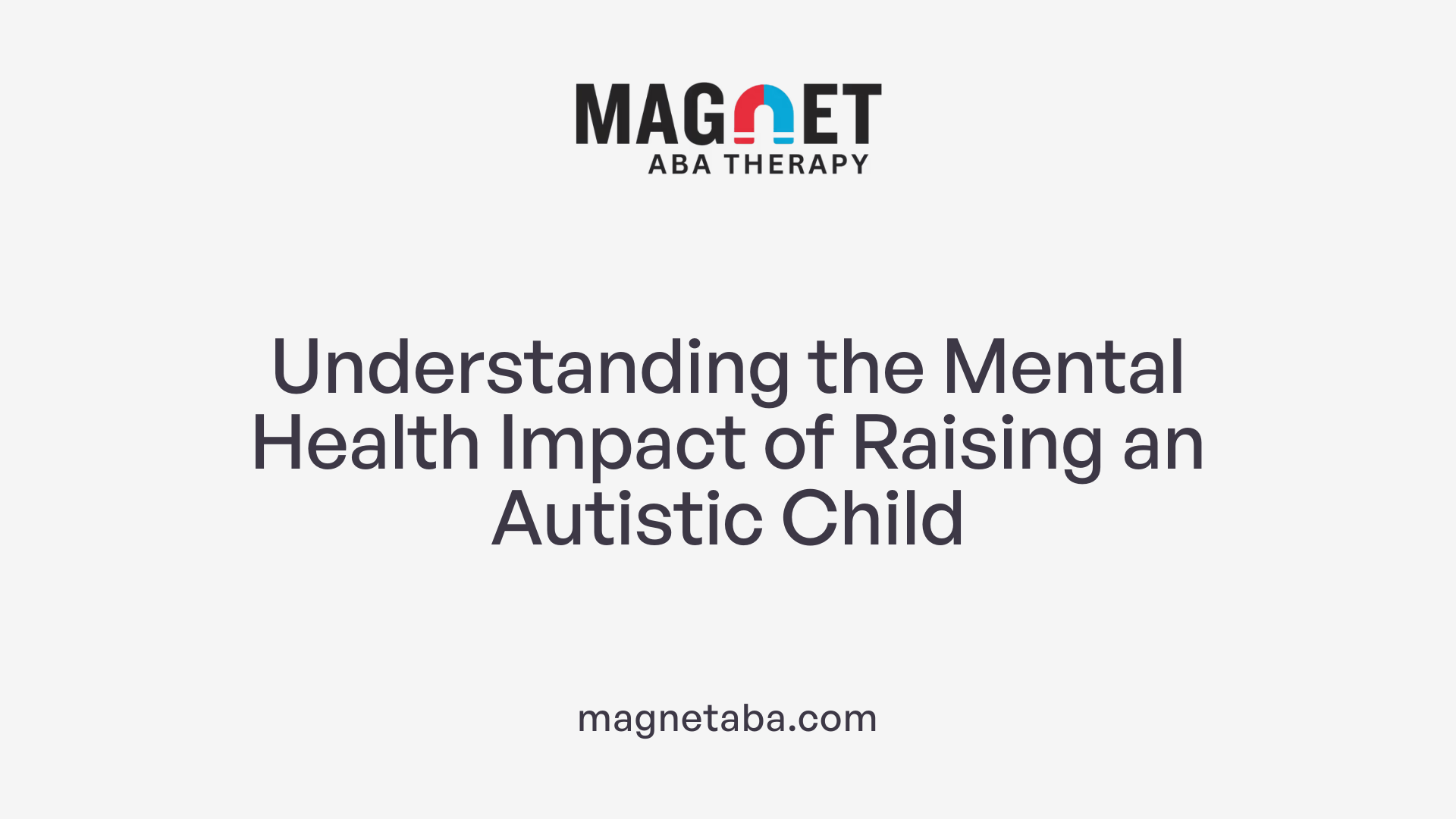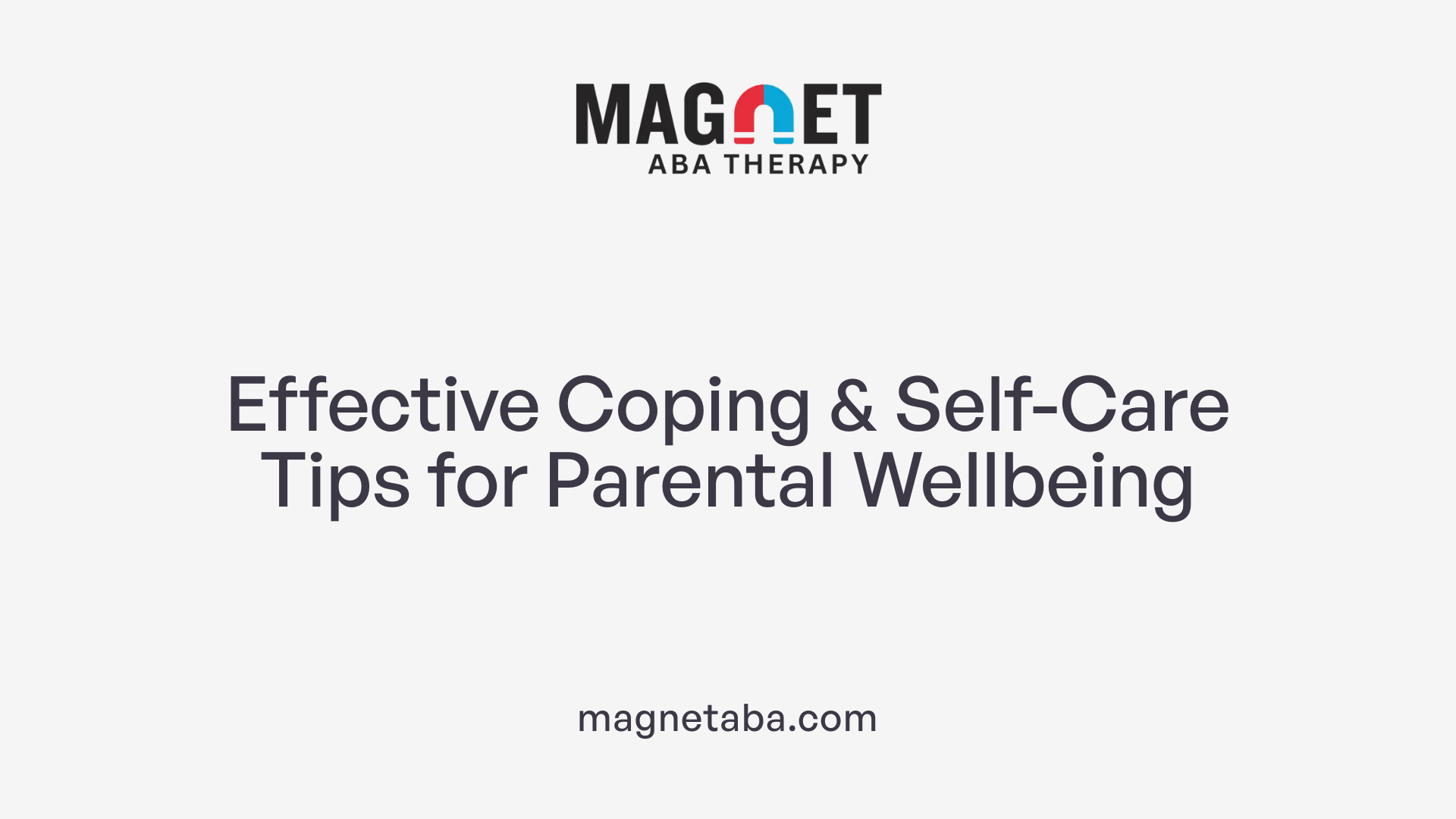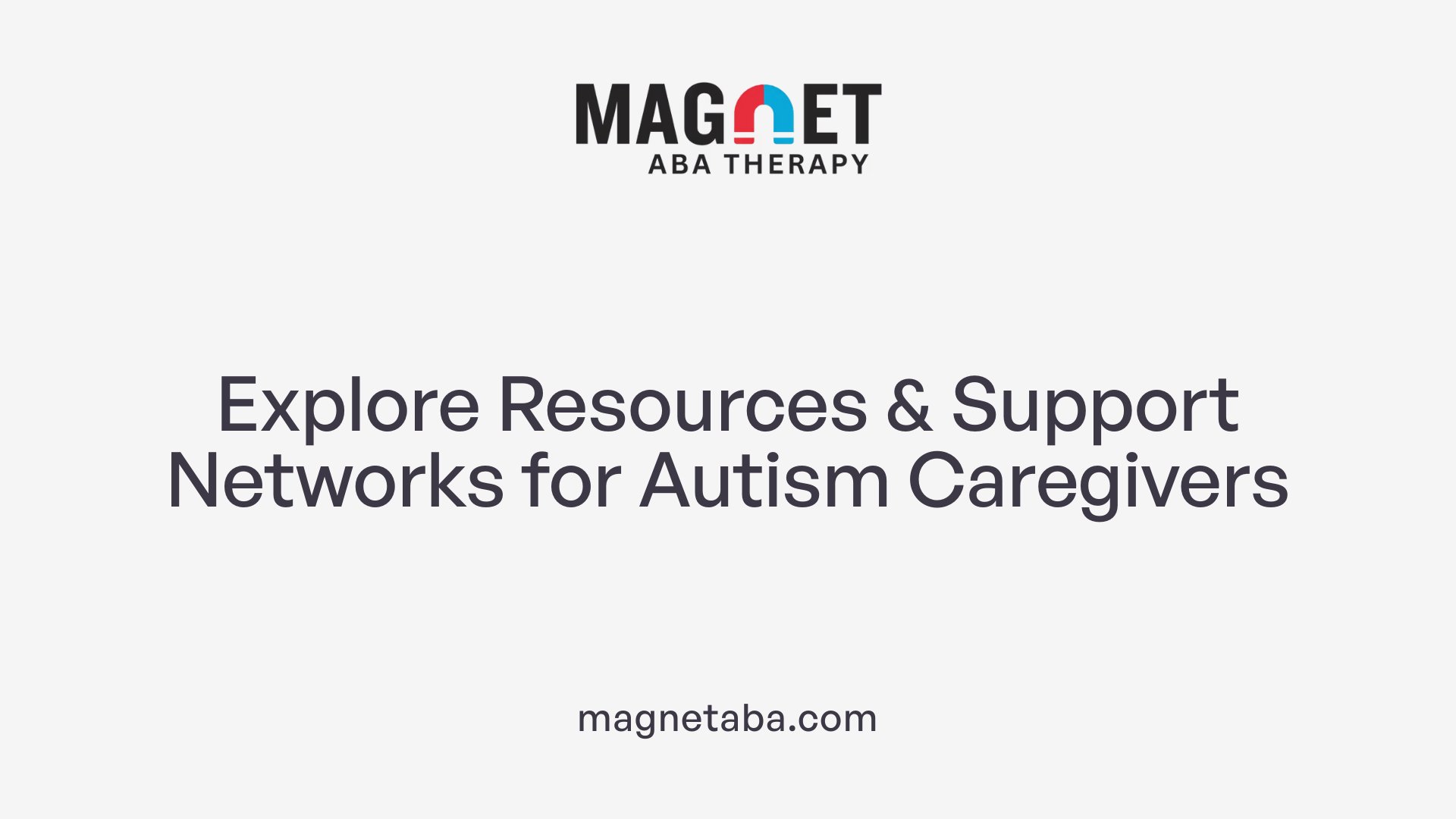Navigating Parenting Stress and Burnout in Autism Caregiving
Parenting a child with autism can be profoundly rewarding but also incredibly demanding. The persistent caregiving responsibilities, emotional strain, and social isolation often lead parents to experience burnout—a state of mental, physical, and emotional exhaustion that can impact both the parent and the child. Recognizing and addressing burnout is vital for maintaining both parental well-being and the child's development. This article explores what parental burnout entails, its signs and symptoms, the causes specific to autism caregiving, and practical strategies to manage and prevent it, ensuring parents can support their children effectively while maintaining their own health.
What is Parental Burnout?
Parental burnout is a state of profound emotional, physical, and mental exhaustion caused by the ongoing stress and demands of parenting. This condition is especially common among parents caring for children with autism, due to the increased caregiving responsibilities, societal pressures, and challenges involved.
The burnout process involves three main aspects. First, overwhelming exhaustion manifests as persistent fatigue, physical health issues like headaches and gastrointestinal problems, and a sense of being completely drained. Second, emotional distancing refers to reduced emotional engagement with the child, feelings of detachment, or emotional numbness, which can impair parent-child interactions. Third, perceived inefficacy relates to feelings of inadequacy, loss of confidence, and questioning one's ability as a parent.
Symptoms of parental burnout span physical, mental health, and behavioral domains. Physically, parents may experience sleep disturbances, headaches, muscle pain, and gastrointestinal issues. Mentally, signs include anxiety, depression, irritability, and difficulty concentrating. Behavioral symptoms may encompass social withdrawal, neglect of responsibilities, increased substance use, or conflicts within the family.
Recognizing these signs early is crucial. Factors such as high parenting demands, lack of adequate support, societal stigma, and ongoing stress from managing a child's needs contribute to burnout. Effective management involves seeking support through community resources, establishing self-care routines, setting realistic expectations, and consulting mental health professionals if necessary.
Understanding and addressing parental burnout is vital to maintaining both parental well-being and the child's development, especially in autism caregiving contexts. Providing parents with tools and support can significantly reduce burnout risks and improve overall family health.
Signs and Symptoms of Parental Burnout

What are the common signs and symptoms of parental burnout?
Parental burnout manifests through a blend of emotional, physical, and behavioral symptoms that signal significant distress. Emotionally, parents often report feeling deeply exhausted, overwhelmed, and emotionally distant from their children. They may experience irritability, mood swings, and a loss of joy or fulfillment in parenting activities.
Physically, burnout can present as sleep problems, persistent headaches, muscle tension, fatigue, and in some cases, gastrointestinal issues. These physical symptoms reflect the body's response to prolonged stress and exhaustion.
Behaviorally, parents might withdraw socially, neglect responsibilities, or develop unhealthy coping strategies like overeating or substance use. They could also have difficulty communicating effectively or managing challenging behaviors from their children.
The mental health repercussions include feelings of depression, heightened anxiety, and a sense of ineffectiveness. Over time, these symptoms can severely impair daily functioning while straining family relationships.
Recognizing these signs early is crucial. Without intervention, parental burnout can lead to more serious health consequences and diminish the quality of parenting, affecting the emotional and psychological well-being of both parent and child.
Causes and Contributing Factors in Autism Caregiving
What are the causes and contributing factors of parental burnout in caregiving for autistic children?
Parental burnout among caregivers of autistic children results from a complex combination of factors that heighten stress and exhaustion. One of the primary causes is the demanding nature of caregiving, which encompasses managing daily routines, therapies, educational meetings, and behavioral challenges. These responsibilities often lead to intense mental, emotional, and physical fatigue.
The severity of the child's autism plays a significant role. Children with more pronounced symptoms tend to require more constant attention, specialized interventions, and behavioral management, increasing parental strain. The child's age is also a factor, particularly during early childhood when developmental milestones and therapeutic support demands are high.
In addition, parents often grapple with feelings of guilt and internalized stigma stemming from societal misunderstandings and low acceptance of autism within the community. Social isolation is common, especially when societal stigma limits social interactions and support networks.
Support system limitations can severely impact a caregiver’s mental health. Lack of accessible respite care leaves parents with little time to rest or focus on self-care, leading to emotional depletion. Financial stress further complicates this picture, as the expenses related to therapies, special education, and related supports can be overwhelming.
Other external influences include cultural perceptions of autism and available community resources. Variations in these factors can either mitigate or intensify burnout risk. Single parents or those with limited social support tend to be more vulnerable due to the lack of shared responsibilities and emotional backing.
Ultimately, the degree of parental burnout depends on an interaction of the child's needs, the parent's emotional resilience, and the availability of external support and resources. Recognizing these factors is crucial in developing effective interventions to support caregivers.
Impact of Autistic Child on Parental Mental Health

How does raising an autistic child impact parental mental health?
Raising an autistic child can markedly influence a parent's mental health, often resulting in heightened levels of stress, anxiety, depression, and emotional fatigue. The daily caregiving demands, combined with managing challenging behaviors and communication difficulties, place significant emotional burdens on parents.
Children with autism frequently exhibit symptoms such as sensory sensitivities, communication struggles, and behavioral issues, which can increase parental frustration and feelings of helplessness. The more severe or persistent these symptoms are, the greater the caregiver strain tends to be. Additionally, parents often face societal stigma, low community support, and a lack of accessible resources, further contributing to mental health challenges.
Research indicates that deficits in emotion regulation among parents are linked to higher rates of depression and anxiety. Parents who can effectively manage their emotions tend to experience fewer symptoms of mental health distress. Conversely, those who struggle with emotion regulation may experience overwhelming feelings and emotional burnout more quickly.
Supported by various interventions, such as parent training programs, mindfulness-based stress reduction, and acceptance and commitment therapy, many parents find relief and improved well-being. These approaches help parents develop resilience, better cope with stressors, and reduce symptoms of anxiety and depression.
In summary, the mental health of parents raising autistic children can be significantly compromised without adequate support and resources. Targeted interventions that bolster emotion regulation skills and provide emotional and practical support are essential for fostering healthier family dynamics and enhancing parental well-being.
Strategies for Recognizing and Preventing Burnout During Autism Therapy

What strategies can help parents recognize and prevent parental burnout during autism therapy?
Parents involved in autism therapy journey often face intense caregiving demands that can lead to burnout. Recognizing early signs of exhaustion is vital. Parents should routinely monitor their physical state—looking out for fatigue, headaches, sleep disturbances, and physical pains—and emotional health, including irritability, emotional numbness, or social withdrawal. These are common indicators of burnout.
Building a support network is another crucial step. Connecting with family, friends, support groups dedicated to autism, or online communities can provide emotional reassurance and practical assistance. Sharing experiences and advice helps reduce feelings of isolation and offers resources that can ease daily burdens.
Equally important is prioritizing self-care. This includes ensuring adequate sleep, balanced nutrition, engaging in mindfulness activities like meditation or breathing exercises, and setting boundaries to manage caregiving responsibilities. Regular self-care practices help maintain resilience and prevent becoming overwhelmed.
Education plays a significant role in managing stress. Learning about autism, therapy options, and advocacy strategies can reduce uncertainty and boost confidence. When parents understand the nature of the condition and available interventions, they are better equipped to handle challenges.
When stress becomes unmanageable despite these measures, seeking professional support is recommended. Therapy or respite care services can offer necessary relief, helping parents stay healthy physically and emotionally. Embracing these strategies ensures parents can continue supporting their child's development while safeguarding their well-being.
Coping Mechanisms and Self-Care Practices
 Parents of children with autism face unique stresses that can lead to burnout if not managed properly. To foster resilience and maintain mental and emotional well-being, experts recommend a variety of coping and self-care strategies.
Parents of children with autism face unique stresses that can lead to burnout if not managed properly. To foster resilience and maintain mental and emotional well-being, experts recommend a variety of coping and self-care strategies.
One essential approach is building a strong social support network. Connecting with family, friends, support groups like those organized by organizations such as AANE or Autism Response Team, and professional services provides emotional reassurance and practical advice. Sharing experiences with others who understand the journey can reduce feelings of isolation and foster motivation.
In addition, mindfulness and relaxation techniques are highly effective. Practices such as meditation, deep breathing exercises, progressive muscle relaxation, and mindfulness-based stress reduction (MBSR) help manage anxiety and improve overall mental health. Regularly dedicating time to these activities can decrease emotional reactivity and enhance sleep quality.
Establishing healthy routines and boundaries is crucial for reducing daily stress. Creating a predictable schedule, setting limits on caregiving responsibilities, and saying no when overwhelmed help prevent emotional exhaustion. Ensuring consistent routines for children also promotes a sense of stability, that benefits both parent and child.
Physical health plays a vital role in stress management. Engaging in enjoyable activities such as walking, gardening, dancing, or team sports not only revitalizes the body but also lifts mood. Prioritizing sleep, maintaining a balanced diet, and including regular exercise contribute significantly to emotional resilience.
Incorporating these self-care practices into daily life helps parents manage the challenges of raising children with autism. By nurturing their well-being through support, relaxation, healthy routines, and enjoyable activities, parents can better cope with stress, avoid burnout, and provide more attentive, compassionate care to their children.
| Support Network | Relaxation Techniques | Routine & Boundaries | Healthy Activities |
|---|---|---|---|
| Family & Friends | Meditation & Breathing | Consistent Schedule | Exercise & Leisure |
| Support Groups | Progressive Muscle Relaxation | Limit Overcommitment | Gardening & Dancing |
| Professional Help | Mindfulness & Stress Reduction | Schedule Breaks | Walking & Outdoor Activities |
| Online Communities | Cognitive Therapy | Flexible to Needs | Yoga & Team Sports |
Resources and Support for Parents of Autistic Children

What resources and support options are available for managing parental stress and burnout?
Parents of children with autism face unique challenges that can lead to significant stress and burnout. Fortunately, a variety of resources and support systems are available to help parents manage these difficulties.
Counseling services can offer a safe space for parents to express their feelings, develop coping strategies, and receive professional guidance. Support groups, both local and online, connect parents with others experiencing similar challenges, providing emotional validation and practical advice. Many organizations such as Autism Support Networks and parent-led organizations like AANE or ARC organize regular meetings, workshops, and educational seminars to empower parents.
Educational resources are abundant and include books, webinars, on-demand courses, and informational workshops focused on autism care, behavior management, and self-care strategies. Online communities and moderated social media groups offer accessible peer support, allowing parents to share experiences, ask questions, and receive encouragement at any time. Helplines such as the 988 Suicide & Crisis Lifeline or dedicated parent stress helplines provide immediate assistance for urgent emotional support.
Apart from emotional support, practical assistance such as respite care provides temporary relief from caregiving duties. Respite services can range from in-home care to community programs and are often subsidized through Medicaid waivers, CHIP, SSI, or grants. These services allow parents to rest, relax, and regain their strength.
Financial support programs help offset costs for therapies, specialized services, and equipment. Knowledge about available resources like Medicaid waivers, SSI, and various grants is vital for families facing financial strain.
Furthermore, engaging in self-care practices—including microbreaks, deep breathing exercises, physical activity, and leisure pursuits—can significantly reduce stress. Reframing parenting challenges, accepting imperfections, and reconnecting with personal values can foster resilience and improve mental well-being.
When stress seems overwhelming or symptoms of burnout intensify, seeking help from mental health professionals or healthcare providers becomes necessary. These professionals can offer tailored interventions, including therapy or medication if needed, to support parental mental health.
In summary, combining emotional, practical, and educational support options can create a comprehensive approach to managing parental burnout and promoting well-being.
| Support Type | Examples | Additional Details |
|---|---|---|
| Counselling & Therapy | Individual, family, or group therapy | Access through clinics, online platforms, or school programs |
| Support Groups | Local meetups, online forums, organization-led groups | Provides emotional validation and shared experiences |
| Educational Resources | Seminars, webinars, books, courses | Focused on autism care, stress management, and self-care |
| Helplines & Crisis Support | 988 Suicide & Crisis Lifeline, Parent Stress Line | Immediate emotional support and crisis intervention |
| Respite Care | In-home services, community programs | Temporary relief from caregiving duties |
| Financial Assistance | Medicaid waivers, SSI, grants, subsidies | Helps cover therapies, equipment, and other costs |
| Self-care & Wellness Programs | Mindfulness, physical activity, leisure activities | Enhances emotional resilience and physical health |
These resources collectively support parents through education, emotional validation, practical relief, and financial assistance, fostering better well-being for both parents and children.
Supporting Parental Mental Health Through Awareness and Education
How can awareness and education help address parental burnout in autism caregiving?
Raising awareness and providing education are essential components in alleviating parental burnout, especially for those caring for children with autism. When parents are well-informed about ASD, its symptoms, and effective management strategies, they tend to feel more empowered and less overwhelmed by their caregiving responsibilities.
Educational programs tailored for parents, such as training in behavioral analysis and intervention techniques like P-ESDM (Promoting the Emergence of Advanced Knowledge) and JASPER (Joint Attention, Symbolic Play, Engagement, and Regulation), give parents practical tools to handle challenging behaviors. These programs help parents learn how to implement structured routines, communicate effectively, and manage sensory sensitivities, which collectively reduce stress.
Knowledge about intervention methods enhances interactions between parents and children, fostering better emotional bonds and a sense of control. Moreover, understanding therapeutic approaches equips parents to collaborate more confidently with educators and therapists, leading to more consistent support for the child's development.
Support groups and shared experiences also play a significant role. Connecting with others facing similar challenges offers emotional relief, reduces isolation, and creates a sense of community. Sharing advice and coping strategies within these groups can normalize feelings of exhaustion and help parents acquire practical solutions.
Overall, sustained education and awareness initiatives empower parents by improving their understanding of ASD, enhancing caregiving skills, and expanding support networks. This comprehensive approach not only boosts confidence but also helps in managing stress more effectively, thereby preventing or reducing feelings of burnout.
Fostering Emotional Resilience and Maintaining Wellbeing
What tips can help maintain emotional well-being and resilience while parenting autistic children?
Parenting a child with autism involves many emotional and physical demands, which can sometimes lead to burnout or feelings of overwhelm. To foster resilience, it is important for parents to adopt multiple supportive practices.
First, prioritizing self-care activities can make a significant difference. This includes ensuring adequate rest, engaging in regular physical activity, practicing relaxation techniques such as deep breathing or meditation, and carving out time for hobbies and enjoyable pursuits. These activities help replenish emotional energy and reduce stress.
Acceptance plays a crucial role in maintaining mental wellbeing. Embracing autism as a core part of the child's identity and focusing on their strengths can shift perspectives from stress and frustration to understanding and appreciation. Such acceptance helps lessen feelings of guilt or helplessness.
Building a reliable support system is vital. Connecting with family, friends, and community groups can provide emotional comfort and practical help. Support organizations like the Autism Acceptance Network (AANE) or local parent groups offer a sense of community where parents can share experiences and advice.
Inner resilience can also be cultivated through mindfulness and self-awareness. Practices like journaling, mindfulness meditation, and regular introspection help parents understand their emotional triggers and develop coping strategies. Recognizing signs of stress early allows for intervention before feelings of burnout intensify.
Furthermore, fostering a positive outlook by focusing on small achievements and maintaining hope can bolster resilience. Engaging in self-reflection and cultivating optimism helps parents better adapt to the ongoing challenges of raising an autistic child.
Overall, through a combination of self-care, acceptance, community support, mindfulness, and positivity, parents can sustain their emotional wellbeing and strengthen their capacity to provide loving, patient care.
Supporting Parents for a Healthier Future
Parental burnout is a pervasive challenge faced by many parents of children with autism. Recognizing the signs early and implementing effective coping strategies—such as building support networks, practicing self-care, and seeking professional help—are vital steps toward sustaining parental well-being. Broadening awareness and education about autism and caregiving can empower parents, reducing feelings of isolation and helplessness. Taking care of parents' mental and physical health not only benefits the caregivers themselves but also creates a nurturing environment where children with autism can thrive. Investing in resources, community support, and mental health services is crucial for a collective approach to tackling caregiver burnout, ensuring healthier families and resilient futures.
References
- Effective Strategies For Managing Autism Parent Burnout
- Coping with Burnout as a Parent of a Special Needs Child - Talkspace
- How Parents and Caregivers of Kids with Autism Cope with Stress
- Neurodivergent, ADHD, and Autistic Parent Burnout: How to Know if ...
- Parent Burnout is Real... 5 Tips That Help
- The Relationship between Parenting Stress and Parenting Burnout ...
- Caregiver Burnout: 6 Incredible Preventing Strategies
- Parent Self-Care for Autism : Managing Stress and Burnout












